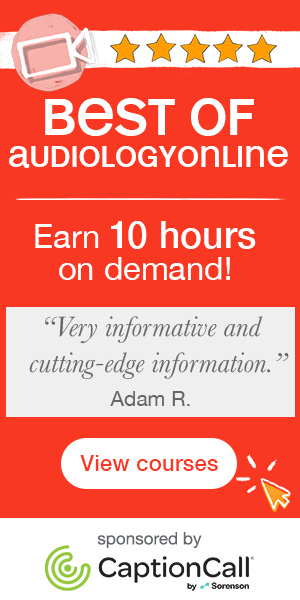The Future of Audiology: Inspired by Their Own Hearing Loss, Four College Students Pursue Audiology
Caroline Moran and Kimberlyn Wellman, Baha System users, and Victoria Popov and Jasmine Simmons, Cochlear Implant recipients, share their hearing loss journeys, what inspired them to pursue hearing loss focused careers and why they feel it is so important to help others with hearing loss.
AudiologyOnline: How was your hearing loss discovered?
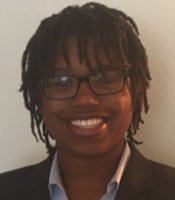
Jasmine, Cochlear Implant recipient, attending Central Michigan University: I was born profoundly deaf, but it was not until I was three or four months old that my parents discovered this. When I was born, hearing screenings on newborns were not mandatory, but I was screened since my older brother had profound sensorineural hearing loss. I was misdiagnosed at birth, and my parents went home thinking that I was hearing. A few months later, my parents started to suspect that I had a hearing loss, which was confirmed with an auditory brainstem response (ABR) test.
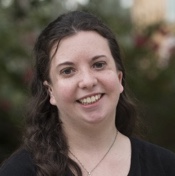
Caroline, Baha System user, attending Nova Southeastern University: I was born with Treacher Collins syndrome, a condition that affects the development of bones and tissues in the face. Many individuals with this syndrome are born without ears, or if they are born with ears, they are often small or unusually formed. This was my situation. When I was born, I had very small ears, and while hearing aids worked for a while, I eventually needed something more powerful and that would fit my lifestyle. That is when my family and I discovered bone conduction implants.
AudiologyOnline: How has your Baha System impacted your life?
Caroline: The Baha System has made a significant impact on my life since first receiving it in 2011, particularly as it relates to my self-confidence. The Baha sound processors are very discreet, so for the first time in my life, my hearing devices were not the first thing people saw when they looked at me. I could create first impressions based on my personality alone, with no influence from the fact that I wore something to help me hear. It gave me a chance to discover myself more. Many people I meet have no idea I even wear a hearing device until I tell them. It is like my hidden super power!
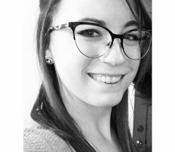
Kimberlyn, Baha System user, attending Central Michigan University: The Baha System has greatly improved my communication. I feel much more confident in noisy situations and do not feel as exhausted after the day. Listening can be exhausting, so putting energy into other aspects is so freeing!
AudiologyOnline: How has your Cochlear Implant impacted your life?
Jasmine: My Cochlear Implant has presented me with numerous opportunities that I never thought I would get to experience. Having a Cochlear Implant has shown me that the field of audiology exists! If I had not been born deaf, I most likely would not have heard of this profession. So, I am extremely grateful things worked out the way they did. I would not trade my Cochlear Implant experience at all. Everything happens for a reason.
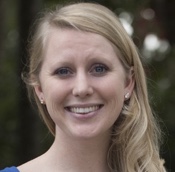
Victoria, Cochlear Implant recipient, attending Rochester Institute of Technology: Getting a Cochlear Implant has been one of the best decisions of my life. It enabled me to hear sounds I did not even know existed—birds chirping, waves crashing and recoiling from sand, and even the sigh of a horse. The benefits I experienced from my first Cochlear Implant inspired me to get my second one when I was 17, which allowed me to enjoy the gift of surround sound. I could finally relax and not have to put so much effort into trying to piece together what people were saying.
AudiologyOnline: What attracted you to your career choice?
Victoria: Experiencing the empowering and life-changing difference cochlear implants had on my life solidified my interest in biotechnology and human medicine. I love how medicine is constantly changing, and alongside my eager passion for otolaryngology, I was able to tie my passion in with biomedical sciences.
Caroline: My personal experiences growing up with a hearing loss were definitely a big factor. Additionally, seeing an audiologist annually and job shadowing one in high school all influenced me to pursue audiology. I just finished my first semester in graduate school for audiology, and I am very happy with the career choice I have chosen.
AudiologyOnline: Is there a specific moment that inspired you to pursue a career in audiology?
Caroline: The audiologist who worked with me through my Baha System fitting process was a great influence and let me shadow her a few days in the hospital. That shadowing experience is what prompted me to pursue audiology as a career.
Kimberlyn: I was originally intending to go to Johnson and Wales for sports management. But, one day, after seeing my ENT for follow-up and getting my Baha System looked at, I thought to myself, being an audiologist might be interesting. I took that thought and ran with it! I changed my college choice and immediately enrolled with the University of Norther Colorado and signed up for the audiology and speech language science major.
Jasmine: When I was in seventh grade, I was in the care with my mom and we were talking about potential careers, she asked, “What about audiology?” That is when I knew exactly what I wanted to do. When I’m an audiologist, I want to help people have the exact same opportunities that my audiologist gave me. I love my former audiologist. She has been there for me since day one, and I want to do the same for my patients. I want them to have access to the world of sound.
AudiologyOnline: Is there a specific moment that inspired you to pursue a career as an ENT?
Victoria: From an early age, I was blessed with a passion for medicine. As I got older I started to act on my passion, which led to many wonderful opportunities. I am an avid horseback rider, and when I was at the barn I was the student who would be alongside the veterinarian observing her procedures and helping out when I could. However, I learned that I could not detach my emotions with veterinary medicine, so later, when I was in high school, I volunteered in the emergency room at Scripps Memorial Hospital Encinitas. I discovered a new passion and continued to seek out opportunities. I shadowed an orthopedic surgeon and loved the OR setting and found the procedures intriguing, but it was not until I saw my first cochlear implant surgery that I discovered my true passion. Throughout my educational career, I have been inspired by the otolaryngology field, and I cannot wait until I can practice medicine as an ENT.
AudiologyOnline: What do you hope to accomplish by helping others with hearing loss?
Kimberlyn: I hope to help others experience how their lives can change through treating their hearing loss. This does not have to be just amplification, but communication strategies as well. I want to help others when they are struggling and let them know that I empathize. If I can change someone's life for the better, or help them get answers, then I feel that I am a success.
Jasmine: My goal is to make sure other people with hearing loss are able to achieve their goals and dreams. My former audiologist was able to give me access to the world full of sound, and I just want to give another person the same opportunity. I want people to know that anything is possible. Our hearing loss should not stop us from living and enjoying life.
Victoria: Having been born with a profound sensorineural hearing loss has been a blessing in disguise. I feel it has taught me how to be tenacious and to never stop pursuing my dreams. The experiences I have had in the medical field, both clinical and with research, have inspired me to be a role model for others with a hearing loss, or another disability, who have an undeniable passion for medicine, and even the otolaryngology field. I want to inspire other people to not be limited by societal assumptions about what they can or cannot do.
Caroline: I hope to help people manage their hearing loss with hearing technology as an audiologist and help them understand that their hearing loss does not have to dictate the amount of success they can achieve in their lives. I want to encourage people who may feel their hearing loss will prevent them from fulfilling their dreams to stay tenacious and persevere.
AudiologyOnline: What advice do you have for fellow college or grad students with hearing loss or hearing implants?
Kimberlyn: Talk about it. Sometimes being your own self-advocate is the most important part. I hardly ever talked about my hearing loss before my hearing implant. But now, I embrace it. I tell people that I have a hearing loss and sometimes struggle, and that is OK. Also, make sure you keep up with hearing evaluations. If you do not, your audiologist will get frustrated and reprimand you.
Jasmine: Stay persistent! Keep at your goals and dreams. If you want something bad enough, you will be able to achieve anything you set your mind to. There are going to be people who try to bring you down due to your disability, but do not let those people get to you and strive for greatness.
Victoria: Network with as many of your professors and professionals in your desired field as you can, even if it does not seem beneficial at the time. I have found some of the biggest opportunities stemmed from the connections I made. But do not forget, we are all human beings in the end, so it is OK to make mistakes, especially since that is when we learn most. I have found college to be a wonderful time for me to pursue my passion for medicine, but to also discover other passions, such as hiking, running and baking.
Caroline: If you have not fully accepted your hearing loss as a part of you yet, now is the time. I always tried to hide my hearing loss, but when I started college, I decided it was time to reinvent myself and show people who I truly am. The reaction I received from people was inspiring and motivating. Telling people about my hearing implants and my hearing loss actually drew them in, and I created so many new friends in college because I was honest with them and with myself. So, do not be afraid to let people know about your hearing loss. You may be pleasantly surprised what affect your openness with others will have on you and your future.
AudiologyOnline: After growing up with hearing loss, what does a career in audiology mean to you?
Kimberlyn: Being able to be empathetic with my patients. Growing up with hearing loss gives me an opportunity to help reach out to those who are where I was. I know it can be difficult to hear and that sometimes people are not as accommodating as we sometimes hope. My goal is to be knowledgeable and an advocate for others. With a career in audiology, I hope to help another adolescent that is not sure of what to do and just needs someone to understand; and I can be that person that I sometimes wished I had had at the time I was going through the hearing implant process.
Jasmine: I am extremely passionate about this field. Whenever I am in the clinic now, I love to be able to relate to my patients and understand what they go through. It is nice to be walking in their shoes alongside them.
AudiologyOnline: How do you hope to inspire younger generations with hearing loss or hearing implants?
Kimberlyn: I hope to show others that circumstances should not define your goals. I grew up in a small town with limited options, and my parents were often told that my hearing loss might cause problems academically. I blew the doors off those assumptions and hope to show others they can do the same. I want to inspire others to seek out help, through hearing implants or amplification, even if it seems scary at first. By reminding them to be their own advocate, I hope to help people understand how hearing loss or implants could affect their life.
Jasmine: To follow their dreams. I just want younger generations to be able to achieve their goals and do something they are passionate about.
Victoria: I hope to inspire them to never stop pursuing their dreams and passions. My interest in otolaryngology is ironic in a way due to my own profound hearing loss, but I have found it has brought me a deeper sense of passion for the otolaryngology field. To become an ENT, you have to be tenacious, but it is very rewarding in the end. I hope my journey will serve as an example to younger generations that you cannot let life’s bumps stop you from doing what you love.
Caroline: Receiving the Anders Tjellström scholarship from Cochlear Americas has been a great way for me to meet younger generations and tell them about my experiences living with hearing loss. I was able to tell my story to hundreds of people at Cochlear Celebration in Orlando recently, and I got to talk to children and teenagers who I hope saw me and the other scholarship winners as proof you can achieve anything you set your mind to—even with hearing loss. I hope to keep advocating and educating younger generations in the future by attending other Cochlear conventions and local support groups where I can continue meeting young adults and encourage them to shoot for the stars.
For more information, visit www.cochlear.com/us or the Cochlear Expo Page on AudiologyOnline.

